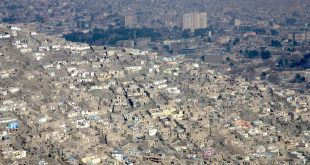After a long time, some good has been happening in the region. Afghanistan and Iran on Sunday announced plans for enhanced security cooperation to fight threats from the Daesh, including possibility of joint military operations and intelligence information sharing regarding drug production, trafficking and human trafficking. Relations have remained turbulent with Iran for most of the times, however now is the time Afghanistan should improve its ties with neighbors particularly Iran and Pakistan. Though the nature of some issues is so complex that they could not be addressed effectively in the near future, but despite that what could be improved should be welcoming. Drugs smuggling, human trafficking, and now the spread of the ISIS in northern Afghanistan are some of the key issues that need urgent attention of Kabul and Tehran.
Many in Afghanistan repeatedly raised the prospect of the ISIS making inroads in this country, though this global jihadist outfit had never formally acknowledged having a presence in the land of Afghans but Saturday’s deadliest attack in eastern Afghanistan has been claimed by the jihadist group. As President Ashraf Ghani said that ISIS presented a serious threat and different form of terrorism—utterly outrageous—therefore, it is need of the hour to form a regional alliance against the emerging threat. Afghanistan, Pakistan and Iran must forge such an alliance which doesn’t allow any space to the ISIS to grow. The sooner this alliance is formed is the better because once this terror group grows it will be a monstrous challenge to cope with. For time being the neighboring countries in the region shouldn’t talk of differences as the trend of the time doesn’t allow the three countries to talk of differences.
Last week the Interior Minister of Iran, Abdul Reza Rahimi Fazli proposed launching a counter-insurgency operation inside Afghanistan and Pakistan territories in order to suppress the spread of Daesh. His proposed operation must be translated into reality as a joint force is not the violation of any state’s sovereignty. Egos should be kept away when it comes to our national unity and peace. Daesh has increasingly collaborated with regional insurgent groups to wage a more stern war that threatens stability of the three countries. Since Daesh is a Sunni movement therefore Iran as a Shiite state looks to the prime target. Policymakers in Tehran know about it well and therefore their concerns must not be ignored. Moreover, Fazli’s proposal came just a few days after a terrorist group known as Jaish-ul-Adl killed eight Iranian borders guards at a crossing between Pakistan and Iran that triggered tensions between Islamabad and Tehran, though diplomatic exchanges took place and this proposal was tossed off. One thing must be kept in mind that when Ashraf Ghani visited Islamabad, a volleyball tournament in Paktika was struck by terror and 50 people were killed. Now when the Afghan Army Chief visited Pakistan’s Military Academy, a third force Daesh, or any other invisible hand unleashed the floodgates of terror in Jalalabad by killing 33 people and injuring over 120. It means Daesh or any other invisible hand doesn’t want that countries in the region should come closer, bury their past bitter experiences and build a dawn of hope. This hand needs to be exposed and jointly fought.
 Afghanistan Times
Afghanistan Times

